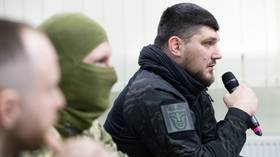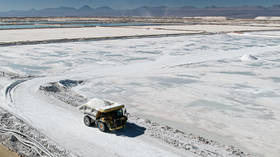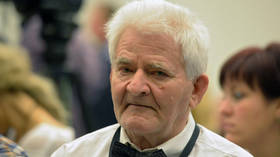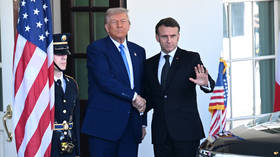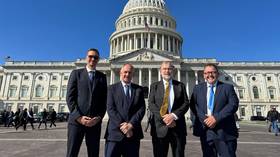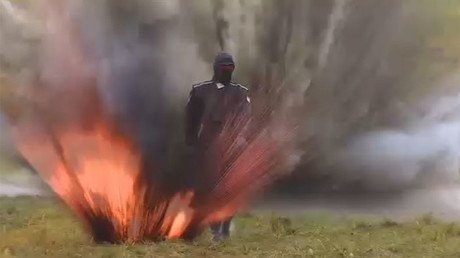‘Highly likely’ is the new evidence: Five times Western officials had no proof but media fell for it

When throwing out serious accusations, it’s always good to back up one’s claims with proof, but the need for evidence seems to have gone out the window lately, replaced with assertions like “highly likely” and “almost certainly.”
From the serious to the absurd, the list of crimes and oddities which Western governments and experts have assigned blame for sans evidence or investigation, seems to be growing exponentially in recent years.
The media, which could have learned a thing or two from the illegal invasion of Iraq – a war launched based on fabricated evidence – seems to be fairly accepting of the lax standards.
Here’s five times the mere say-so of authorities was enough to pin blame.
Iran ‘almost certainly’ attacked Saudi tankers
US National Security Advisor John Bolton claimed this week that Iran was “almost certainly” behind a recent attack on ships, including two Saudi oil tankers, in the Gulf of Oman. Not one for detail, Bolton declined to offer actual evidence to back up the allegation.
The tankers incident happened shortly after the US claimed (also without offering evidence) that Iran might be preparing to attack US interests in the region – a claim that was immediately parroted by a CNN reporter, who was summarily schooled by Twitter users reminding her that war-enthusiasts like Bolton perhaps aren’t the best sources of truthful information.
The media should disregard any statements by John Bolton claiming to have intel on #Iran. His record on both intel and Iran is that bad. https://t.co/oCahVhOzEC
— Max Abrahms (@MaxAbrahms) May 29, 2019
‘Highly likely’ Russia poisoned Skripal
British Prime Minister Theresa May barely waited until the doctors had examined Sergei and Yulia Skripal before accusing Russia of being behind their poisoning last March. May quickly rallied Western governments, prompting a mass expulsion of Russian diplomats without providing any actual evidence of Moscow’s guilt. She emphatically told Parliament that Russia was“highly likely” the culprit. Mainstream media, of course, instantly jumped on that bandwagon and dissenting voices were banished from the airwaves.
Also on rt.com ‘Putin smiles’: Russophobic media is having none of Pompeo’s diplomacy tripBeluga whale ‘most likely’ spying for Putin
In April, Western media was hysterical over the discovery of a Beluga whale “with suspected Russian military ties.” The whale, spotted by a fisherman in Norwegian waters, was wearing a harness, which led to suggestions that some nefarious Russian activity was going on. One expert at the Arctic University of Norway in Tromsoe took a leaf out of the CIA’s book, telling the media that the whale was “most likely” trained by Russia for military purposes. The claim was repeated ad nauseam until it was countered by another Norwegian report that the whale could actually have been trained to entertain children. Oops!?
This is the fourth piece the @guardian has published about this absurd Russian spy beluga whale story. Yet still nothing about the @ceprdc study finding US sanctions responsible for 40,000 deaths in Venezuela.https://t.co/q8L5yH4YyY
— John McEvoy (@jmcevoy_2) May 2, 2019
Assad ‘highly likely’ responsible for Douma
Syrian President Bashar Assad was “highly likely” responsible for a chemical attack on the city of Douma in 2018, according to the British government. The incident was used as an easy pretext for US, British and French bombing in Syria. Surely, they would never lie to us? Well, a report leaked by OPCW engineers earlier this month contradicts the official narrative on the Douma attack, its findings implying that it could have been a staged provocation designed to justify Western bombing.
Some people on here think a leaked OPCW report that challenges the rationale for US military strikes on Syria is unworthy of coverage; & that an eminent MIT physicist is unworthy of being interviewed on the topic. We have different ideas of what journalism is about.
— Aaron Maté (@aaronjmate) May 26, 2019
NotPetya cyber attack ‘almost certainly’ Russia
Both the US and British governments also blamed Russia (surprise!) for the so-called NotPetya cyber attack which hit companies and government systems around the world in 2017, with London saying Moscow was "almost certainly" behind it.
Several Russian companies were also targeted in the attack and officials never gave evidence or explained why the attack was instantly blamed on Russia.
But, while government officials, experts and the media often happen to point the finger without evidence, it's "highly likely" that they aren't always correct.
Also on rt.com Meddling 101: US Army research center publishes strategy to destabilize RussiaLike this story? Share it with a friend!



